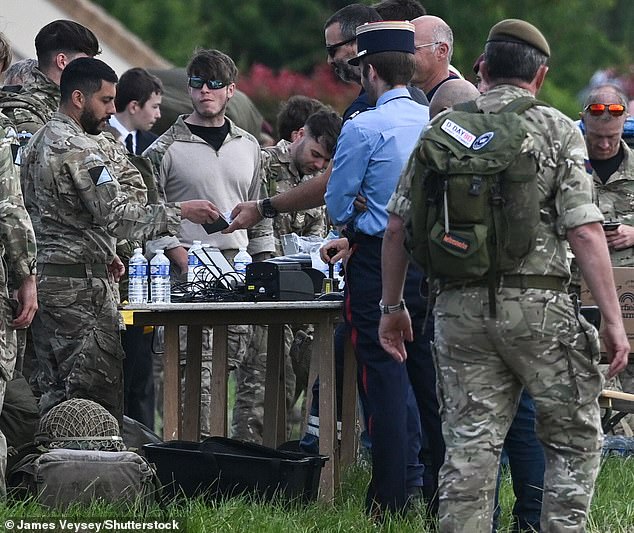The French penchant for bureaucracy faced criticism recently when British paratroopers were met by clipboard-carrying officials as they landed in Normandy.
This event, meant to commemorate the 80th anniversary of D-Day, saw troops forced into a queue in a farmer’s field to present their passports and documents to customs officers.
The absurdity of British soldiers, who were instrumental in liberating France from Nazi control, being subjected to such scrutiny did not go unnoticed by politicians and the public.
A Jarring Reception
Footage from the event shows the paratroopers, including 320 British, Belgian, and US soldiers, being directed to a makeshift border control point as soon as they touched down.
Of the 250 British paras involved, all had to show their passports, unlike their US counterparts, who had already jumped from within France.
This bureaucratic procedure was seen as particularly ironic, given the historical significance of the day and the role British troops played in securing freedom for France.
Public and Political Reactions
Former cabinet minister David Jones highlighted the irony, stating that France’s control over its borders was secured thanks to the bravery of British troops 80 years ago.
His quip, “They risked their lives to make France safe for bureaucracy,” resonated with many who felt the passport checks were an unnecessary and disrespectful gesture.
British citizens also took to social media, humorously questioning where such officials were in 1944 and suggesting that the paratroopers should have timed their jump during the French lunch hour to avoid the checks.
The Historic Jump
The 250 British paratroopers began their journey from RAF Brize Norton in Oxfordshire, jumping into the historic drop zone near Sannerville.
This area, designated as drop zone K, was a critical location during the original D-Day operations. The paratroopers, including Sergeant Danny Mawson, who wore a smock belonging to a D-Day paratrooper, were greeted by a warm welcome from the Royal British Legion Band of Wales, which played “We’ll Meet Again” as the drop commenced.
Tribute to D-Day Heroes
Brigadier Mark Berry, commander of the 16 Air Assault Brigade, led the British paratroopers, emphasizing the contrast between the current event and the original D-Day invasion.
He acknowledged the oddity of the passport checks but considered it a minor inconvenience given the overwhelming hospitality they received from the French people.
The brigade’s arrival was met with cheers and gratitude from local spectators, who lined up to thank the troops and offer high-fives.
Commemorating a Legacy
The event honored the 23,000 airborne troops from Britain, America, Canada, and other Commonwealth countries who participated in the early hours of June 6, 1944.
Their mission, known as Operation Tonga, involved destroying gun batteries and securing key bridges, a task that resulted in significant casualties.
Brigadier Berry paid tribute to these heroes, noting the continued importance of remembering their sacrifices.
Personal Connections
Among the participants was Lance Corporal Addy Carter, a medic in the Royal Army Medical Corps, who made history as the first female paratrooper to jump into Normandy during such a commemoration.
For her, the experience was profound, bringing a deeper understanding of the historical significance of D-Day.
Similarly, Lieutenant Max Phillips, a descendant of a D-Day veteran, reflected on his great-great uncle’s bravery and the humbling experience of retracing his steps.
A Poignant Farewell
The Royal British Legion has indicated that this year’s commemoration might be the last to feature a significant number of Normandy veterans, as their numbers have dwindled over the years.
This year’s event saw only 23 veterans in attendance, compared to 225 five years ago.
The diminishing presence of these heroes underscores the importance of such commemorations in preserving their legacy for future generations.
Conclusion
While the passport checks were an unexpected and somewhat controversial element of the event, the overall commemoration served as a powerful reminder of the bravery and sacrifice of the D-Day soldiers.
The presence of modern paratroopers, coupled with the participation of descendants and the first female paratrooper to jump into Normandy, highlighted the enduring legacy of this historic event.
Despite the bureaucratic hurdle, the spirit of gratitude and remembrance remained strong, honoring those who fought for freedom 80 years ago.
Breaking News
TDPel Media
This article was published on TDPel Media. Thanks for reading!Share on Facebook «||» Share on Twitter «||» Share on Reddit «||» Share on LinkedIn
